In a world increasingly focused on sustainability, the spotlight on methane emissions and their environmental impact has intensified. Methane has become a significant concern in the fight against climate change. In this context, the implementation of methane reduction units holds profound importance for businesses seeking to align with environmental goals while securing long-term operational resilience.
The Urgency of Methane Emission Reduction
Methane emissions pose a dual challenge. Not only do they contribute to global warming, but they also represent a potential economic loss. According to the Intergovernmental Panel on Climate Change (IPCC), over a 20-year period, methane has an impact on global warming far greater than previously estimated. This underscores the urgency for immediate action to curb methane emissions.
Businesses across various industries, from agriculture and energy to manufacturing and waste management, are under increasing pressure to mitigate their environmental footprint. Firms are increasingly adopting sustainability initiatives not only as a moral imperative but also as a means to enhance their brand reputation, attract conscious consumers, and comply with evolving regulations.
The Role of Methane Reduction Units
Methane reduction units are instrumental in addressing these challenges. These units utilize advanced technologies designed to capture, detect, and reduce methane emissions across different operational contexts. Whether it’s through better leak detection and repair strategies, venting and flaring minimization, or enhanced monitoring systems, these units offer scalable solutions tailored to diverse business needs.
-
Environmental Impact Mitigation:
Methane reduction units help businesses decrease their greenhouse gas emissions. By implementing such technologies, companies can demonstrate their commitment to environmental stewardship and contribute positively to global efforts aimed at limiting global warming and climate change.
-
Cost Efficiency and Resource Optimization:
Reducing methane emissions isn’t just about environmental stewardship; it also presents a financial opportunity for businesses. Methane is a valuable resource, and capturing it not only prevents its release into the atmosphere but also provides an opportunity for energy recovery or reuse. Implementing reduction units often leads to cost savings through more efficient resource utilization.
-
Regulatory Compliance and Risk Mitigation:
As environmental regulations continue to evolve and become more stringent, businesses that proactively address methane emissions are better positioned to comply with existing and future mandates. Additionally, mitigating methane emissions can reduce the risk of potential fines, legal actions, and reputational damage associated with environmental non-compliance.
Conclusion
In conclusion, methane reduction units have emerged as indispensable tools for businesses striving to strike a balance between environmental responsibility and operational efficiency. With their ability to mitigate environmental impact, optimize resources, and ensure compliance, these units represent a proactive approach towards sustainability that benefits not only the planet but also the bottom line.
As the world moves towards a more sustainable future, investing in methane reduction units isn’t just a choice but a strategic imperative for businesses aiming for long-term viability in a rapidly evolving marketplace. Embracing these technologies isn’t merely an environmental gesture but a forward-thinking strategy that aligns with the growing demands of consumers, stakeholders, and regulatory bodies in an era focused on sustainability and responsible business practices.
Let the experts at Dearing help you with your methane reduction project. We can custom-design and fabricate packages with quality products from Ariel and Gardner Denver and assist with installation, startup and maintenance. Learn more about Dearing’s engineered packages for the energy market.




